Tinuiti Live 2022 Recap—The New, New Normal: Chaos, Complexity & Change
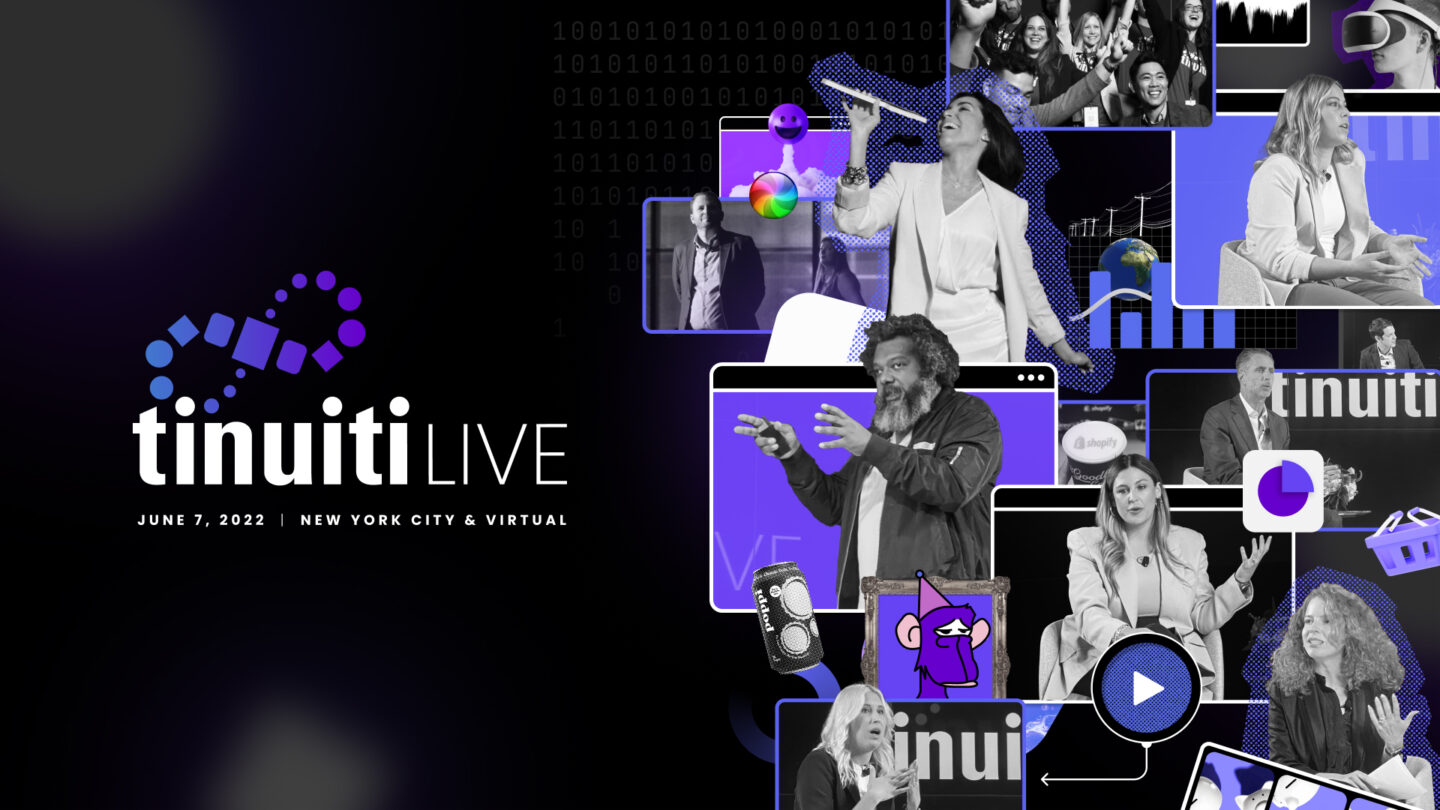

Tinuiti Live brings together marketers from around the world for a day packed with captivating, thought-provoking sessions. This year’s event brought a hybrid experience, with 100+ in-person attendees, and thousands more tuning in virtually.
This year’s sessions centered on the ways we must all adapt to ‘The New, New Normal’ to realize success today. Consumer behavior has shifted, privacy restrictions have had major impacts, and many industry professionals have found themselves in uncharted and tumultuous waters.
At Tinuiti, we’ve made it our mission to help brands navigate each facet of the marketing universe, and at this year’s Tinuiti Live, we aimed to help attendees make order of the chaos, navigate the complexity, and get out in front of the change.
Zach Morrison, CEO, Tinuiti
Dalton Dorné, CMO, Tinuiti
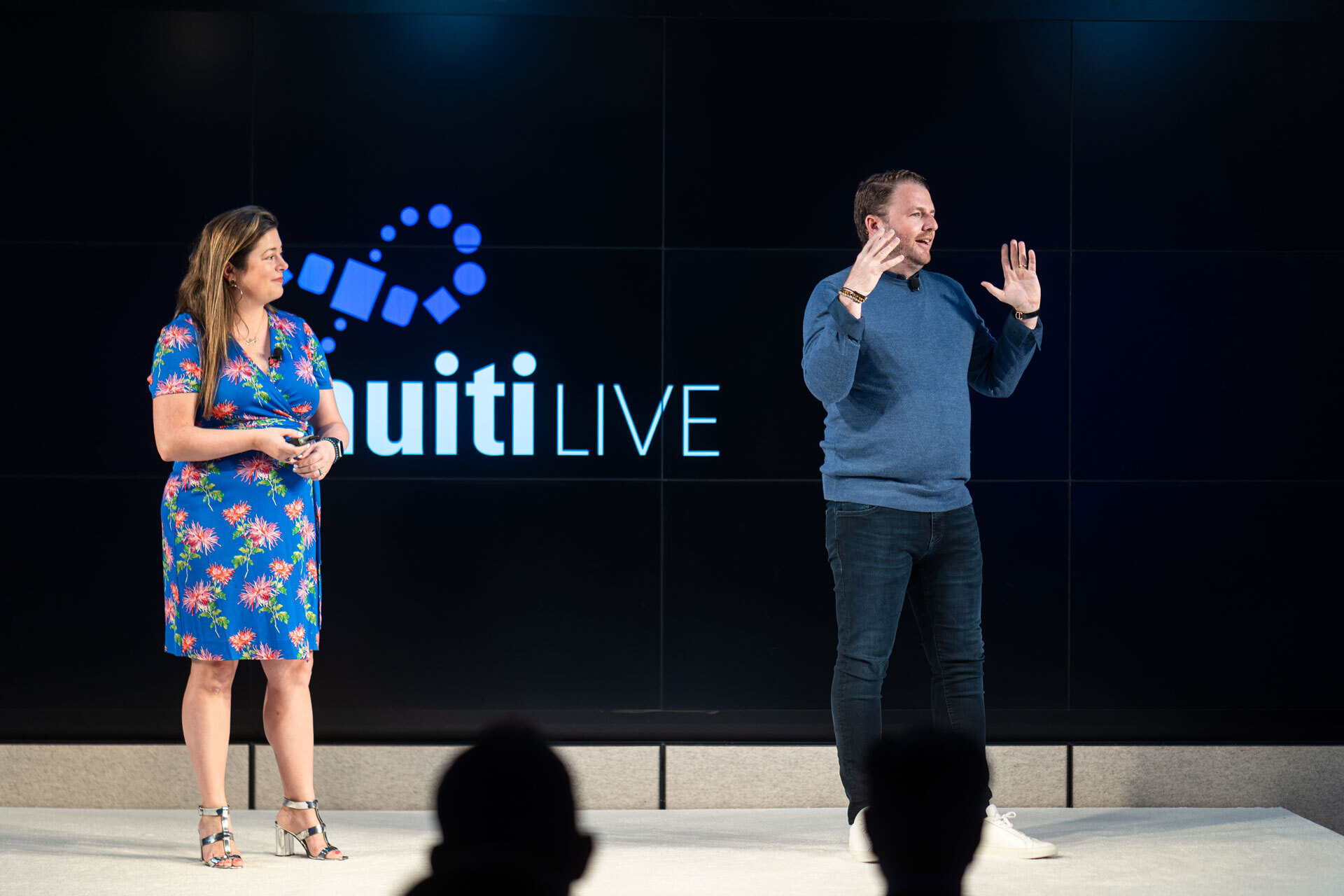
Zach Morrison and Dalton Dorné welcomed in-person and virtual attendees with a reminder that Tinuiti Live was returning to a physical stage for the first time in three years, and that our last in-person Tinuiti Live is where we officially announced our name change to Tinuiti.
In the three years since that announcement, we have continued to focus on our culture, people, and delivering for our clients, and have more than doubled in size, surpassing the 1,000 Tinuitians mark.
“While performance and culture will continue to be at the core of Tinuiti, I think one thing we learned over the past two-and-a-half years is that change is the only constant. And that is really what the theme of today is going to be about—the chaos, the complexity, and that change that has come, and we’re calling it The New, New Normal.”
— Zach Morrison, CEO, Tinuiti
Morrison passed the mic to Dorné to share more about what to expect from the sessions ahead. Dorné noted that our team kicks off planning for Tinuiti Live events by tapping into the most common questions clients ask, and this year, the overwhelming question has been, “WTF? What is actually going on, and what am I supposed to do about it?”
“We have crisis fatigue; we have been dealing with “unprecedented changes” since the beginning of 2020—from the pandemic, to ecommerce spikes that changed businesses and how they met those demands, to the war on talent, inflation, supply chain issues, and all the stuff that’s happening this year. But it’s really important in times of crisis to be very strategic, and to play offense where we can. And we have done exactly that over the last few years at Tinuiti.”
— Dalton Dorné, CMO, Tinuiti
Among the ways Tinuiti has grown more powerful in our capabilities in recent years is through two important acquisitions—Ortega Group and Bliss Point Media. Dorné noted that acquiring Ortega Group helped launch Tinuiti “beyond advertising on Amazon, to full, end-to-end channel management.” The Bliss Point Media acquisition launched our Streaming+ practice, providing our clients with “an incredible way to find new customers” today.
In addition to building on more tactical abilities, Tinuiti has also been focused on DEI at all levels. Today, we have the most diverse leadership team in the industry, and our organization at large is 61% female.
Dorné noted that each of Tinuiti Live 2022 sessions ahead would be broken out into one of three chapters, each with its own keynote that set the tone:
Lastly, she thanked our sponsors, and shared that relaxation and refreshments had been built into the schedule for in-person attendees, thanks to a Sound Bath with Poppi, and a happy hour with Google.
Morrison closed out Opening Remarks, welcoming marketing guru, investor, and author Bonin Bough to the stage for an energetic and entertaining ‘Chaos’ keynote.
Bonin Bough, Chief Growth Officer, Triller
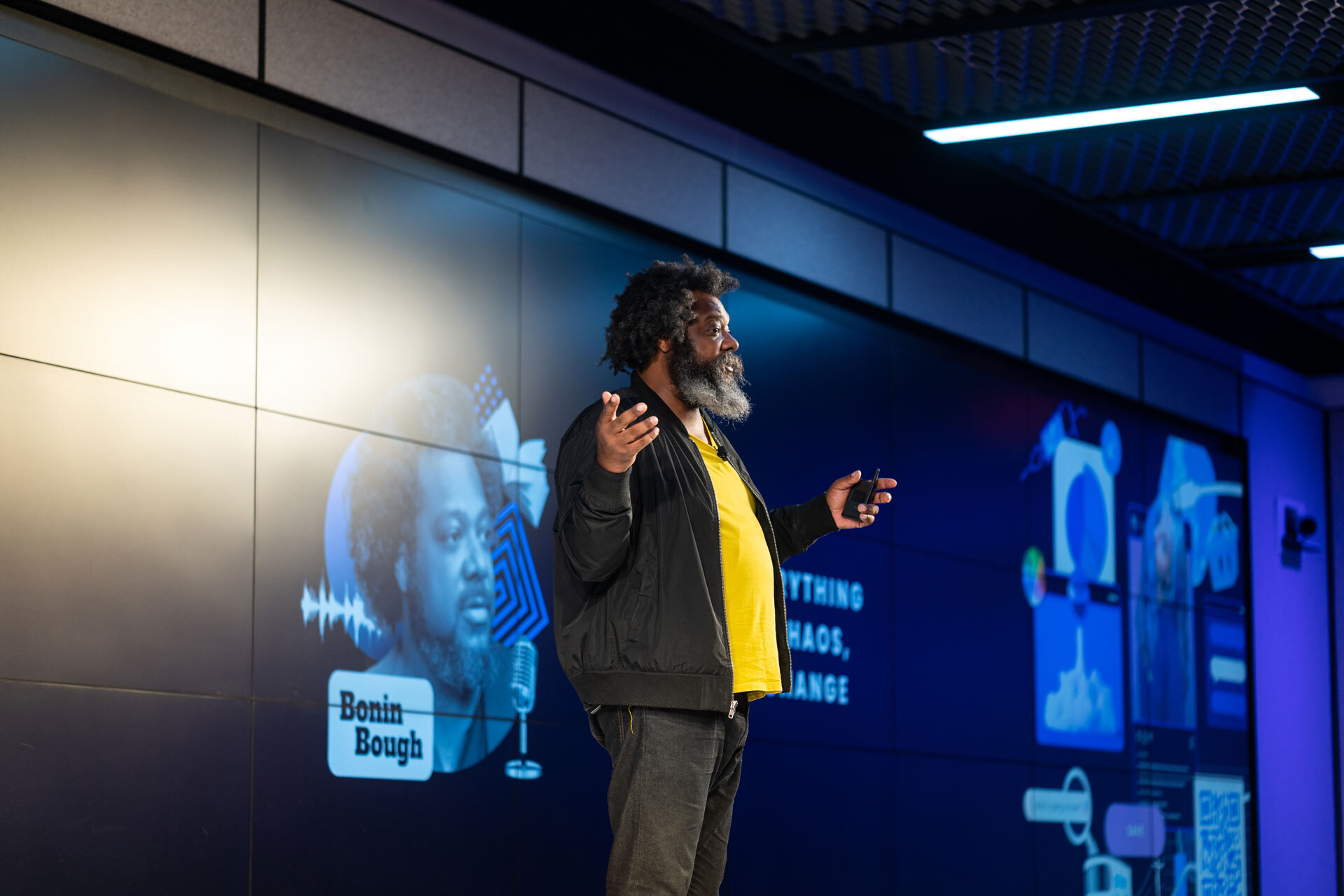
Bonin Bough, one of the most awarded marketing executives in the world, kicked off the first keynote session of Tinuiti Live 2022 with unmatched energy and enthusiasm. Bough dove into his idea of the “hack-on-omy” where he examined how to create value by breaking things and reinvention – this could be anything from your organization, processes, or yourself.
“More now than ever, we have to build a mindset that allows us to continue to create value within the sea of change.”
— Bonin Bough, Chief Growth Officer, Triller
Bough explained how many companies today are looking for that one person to come in and be a change agent, but in many successful companies, everyone is a change agent. He highlighted how that during the pandemic, one thing we all realized is that we are capable of change because we were essentially forced to.
During his session, Bough brought up interesting points around messaging (which many organizations are slow to move on) including the following stats:
Bough then posed the question: “How do we hack the way we engage with consumers?” He shared the following tips (check out the on-demand session for his real-world examples of each!):
Bough wrapped his session by showing us the value in “breaking” things. When working with Oreo, he and his team shook things up by creating a new campaign showing culture through the eyes of Oreo for 100 days (it was their 100th anniversary). One of the first images they created was an Oreo with rainbow stacked frosting to celebrate Pride Month. At first, many people at the time had mixed reactions, but at the end of the day this image was the number one liked post that Facebook had ever seen. Bough went on to show other new and improved ways Oreo changed things up with customizable cookie activations to personalized Oreo packages.
“Here we went from a cookie that hadn’t changed in 60 years to having created new value by breaking things, breaking our model, breaking our approach. And something that started as tiny as a Facebook post ended up driving personalization, then our new ecommerce strategy… We changed our mindset and we began to break how we see the world.”
— Bonin Bough, Chief Growth Officer, Triller
Bough ended his memorable session driving home the point that the best way to predict the future is to hack it. This is a session you won’t want to miss—be sure to check it out on-demand.
Brooke Cullison, Sr. Acquisition Manager, Liquid I.V.
Avi Ben-Zvi, VP, Paid Social, Tinuiti
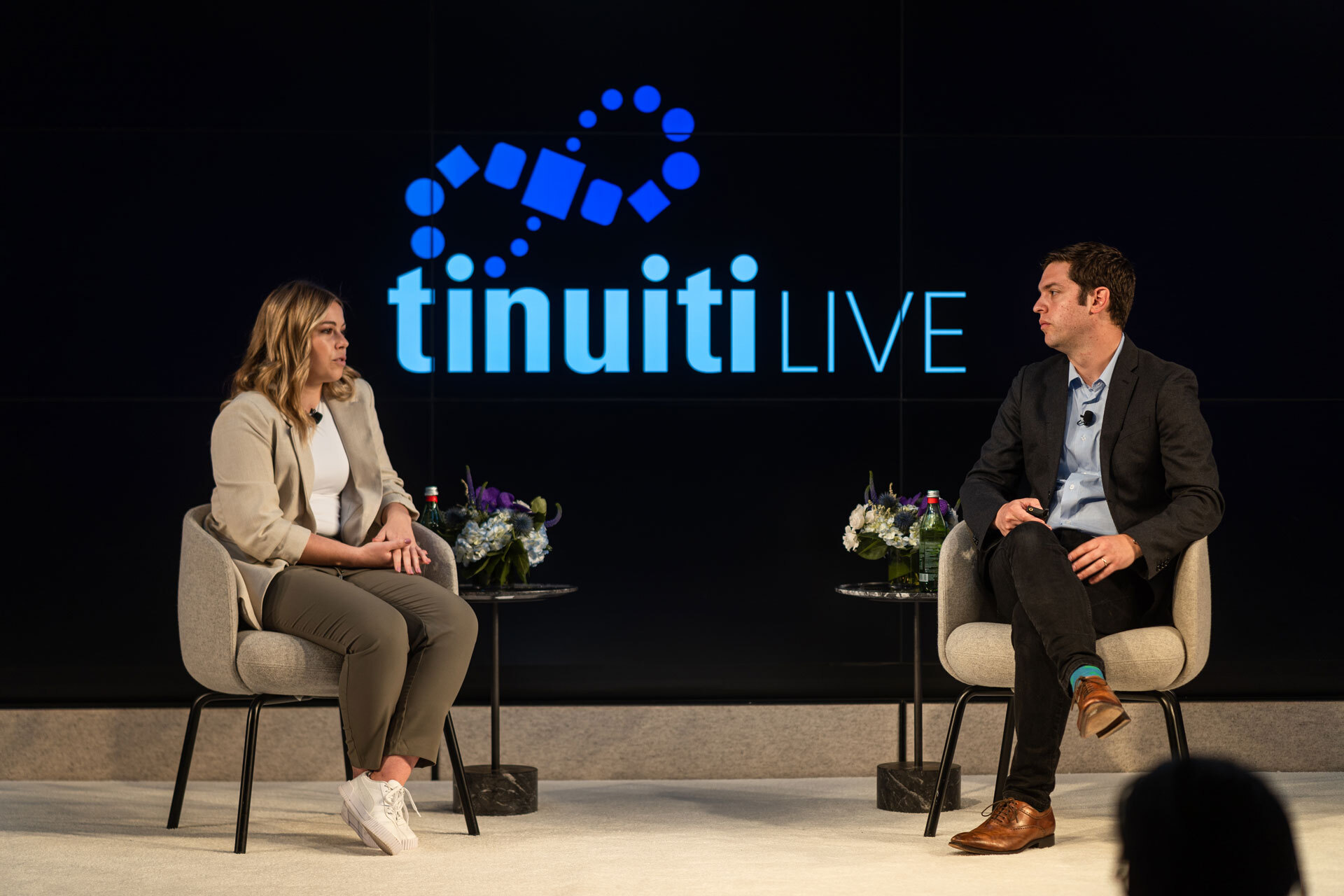
Avi Ben-Zvi and Brooke Cullison discussed the importance of being proactive in adapting your Paid Social campaigns to be ready to shift toward, and accommodate for, whatever the Next Big Thing in Social may be.
Employing an agile, forward thinking, diverse and holistic approach to Paid Social—an advertising channel with more ongoing evolutions than perhaps any other—has proven highly beneficial to Liquid I.V.
Ben-Zvi noted that when he was thinking about which Tinuiti client would be ideal for this session, to discuss how they have evolved their social program in recent years, Liquid I.V. was the first that came to mind.
“The success they’ve seen on social the last few years has just been unbelievable to watch. They’ve really pivoted toward a fully-holistic paid social strategy that encompasses diversification of platforms, different creative placements, and things of that nature. Today, we’re going to talk a little bit about how they achieved that success.”
— Avi Ben-Zvi, VP, Paid Social, Tinuiti
Cullison then explained how Liquid I.V.’s sophisticated marketing strategies help them focus on both performance marketing and awareness branding for a full-funnel approach.
Cullison shared:
Next, Cullison explored Liquid I.V.’s approach to influencer marketing, sharing an example of a wildly successful campaign with Remi Bader.
“Liquid I.V. has always worked with influencers…it’s still a really strong performance channel for us. We really do understand the value that influencers bring to our overall media strategy—we see them as an extension of our brand, and really collaborate with them—because that’s what’s going to lead you to get more of those innovative campaigns and content that really performs.”
— Brooke Cullison, Sr. Acquisition Manager, Liquid I.V.
Additional influencer considerations Cullison shared include:
Cullison shifted focus to the success they’ve seen on TikTok, in particular, kicking off with an example of another influencer partnership with bran_flakezz.
Cullison shifted focus to the success they’ve seen on TikTok, in particular, kicking off with an example of another influencer partnership with bran_flakezz.
“We were on the platform early—we weren’t trying to be perfect with our content; we were having fun and figuring it out like everyone else was back in the beginning of 2020. And that really helped us because we had a baseline to test against. TikTok rolled out an early version of their Creative Marketplace that we jumped on immediately, and we were able to then measure that performance lift that creators’ ads gave us, which was a proof point for us to double down.”
— Brooke Cullison, Sr. Acquisition Manager, Liquid I.V.
Other highlights from this must-watch discussion include how Liquid I.V. leverages Snapchat (and its augmented reality edge over other platforms) for a full-funnel approach, and Reddit (a unique and too-often-overlooked channel that can help you tell your brand’s story from a different or deeper angle), to ensure they’re always speaking authentically to their audience on whichever platform they choose to engage.
Be sure to check it out!
Richard Sutton, CEO, LT Apparel Group
Phil Stolt, SVP of Retail Operations, Tinuiti
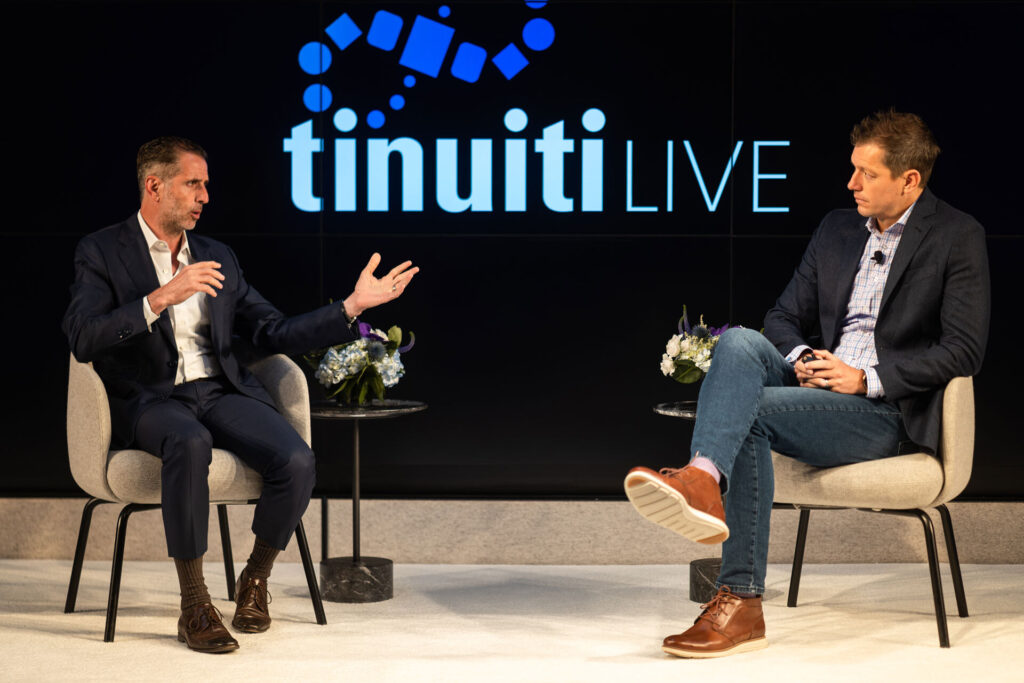
Richard Sutton, CEO of LT Apparel Group and Phil Stolt, SVP of Retail Operations of Tinuiti sat down for a fireside chat highlighting how over the last 2.5 years, so many brands have struggled with lots of start-and-stop to keep operations running and supplies in stock. They discussed supply chain woes, skyrocketing costs, scarcity of raw materials and components, and how many businesses have struggled with decreased YoY revenue. Luckily, this was not the case for LT Apparel Group, as the brand saw an average of 63% growth on a large eight-figure annual Amazon business during the COVID period.
“LT Apparel was one of the few apparel clients that actually had a successful outcome on Amazon during the last 2.5 years during COVID, and it’s because of the operational background that they built over the last 6 years. Since then, they have become a top 3 brand inside of Amazon in kids and baby apparel.”
— Phil Stolt, SVP of Retail Operations, Tinuiti
Stolt posed the question, “how did you survive during this time of difficult challenges in the apparel industry?” Sutton explained…
“There’s a saying that goes, ‘you create your own luck’ and I think we really started with a combination of things including supply chain execution, standing by suppliers, inventory planning, and stockpiling inventory stateside that we thought we were going to be holding for years – the demand really came back a lot quicker than we thought.”
— Richard Sutton, CEO, LT Apparel Group
Sutton highlighted how one of the biggest decisions they made was not canceling product anywhere in the world. He highlighted how his Dad always told him it takes a lifetime to build a reputation and a day to destroy it – LT Apparel Group was not going to let that happen. He covered how the company committed to taking every product, from every factory which allowed their business to have inventory during this time period.
To wrap the session, Stolt and Sutton then went into specifics about the major challenges that brands are facing when it comes to supply chain management and key takeaways brands should consider, including:
“When planning ahead and looking at where your wins are, you can figure out what’s giving you the best ROI—and Tinuiti helped us do that.
— Richard Sutton, CEO, LT Apparel Group
Hayet Rida, Influencer and Creative Strategist, Meta
Ana Isabelle, Actress, Musician, and Influencer 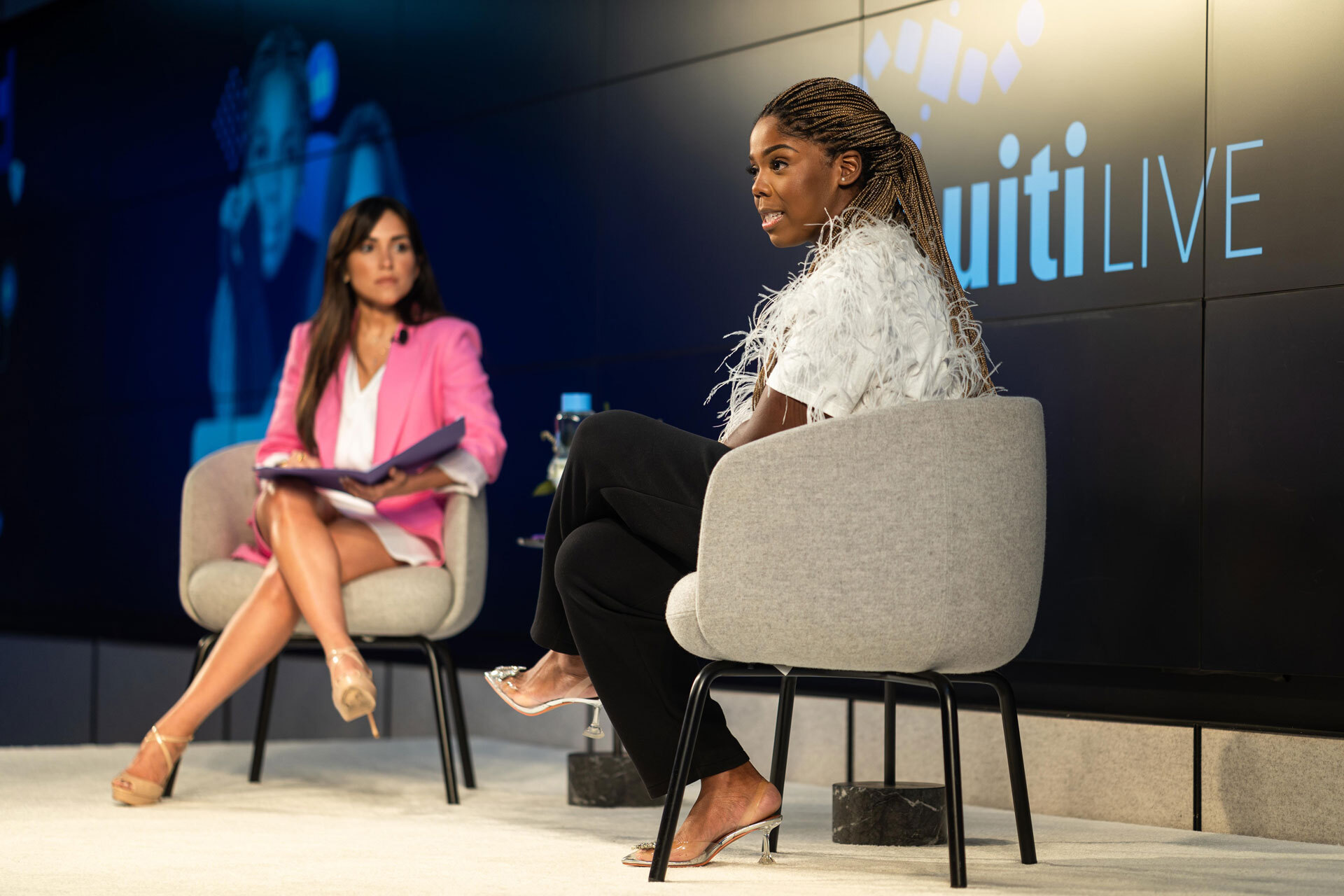 Hayet Rida and Ana Isabelle brought two uniquely valuable perspectives to the influencer marketing conversation. Rida is a Creative Strategist at Meta, with an active second career as a fashion, beauty, finance, travel, and lifestyle influencer. Isabelle—who recently starred as Rosalia in Spielberg’s feature film version of West Side Story—is an accomplished actress, musician, and influencer.
Hayet Rida and Ana Isabelle brought two uniquely valuable perspectives to the influencer marketing conversation. Rida is a Creative Strategist at Meta, with an active second career as a fashion, beauty, finance, travel, and lifestyle influencer. Isabelle—who recently starred as Rosalia in Spielberg’s feature film version of West Side Story—is an accomplished actress, musician, and influencer.
Rida kicked off the conversation by asking Isabelle what the most important elements of her most successful influencer relationships had been. Isabelle highlighted a partnership with an alcohol brand that called on her to have fun and be her authentic self.
“It felt really nice to be able to represent my people, and to know that a brand was looking for people like me to just go out there at Times Square, and celebrate life, winter, alcohol…to me it was success in every way. The event was rewarding, and all the moments of doubting myself — “Can I do this? Am I going to be a good fit?” — were put to rest.”
— Ana Isabelle, Actress, Musician, and Influencer
Rida asked Isabelle to dive a bit further into her definition of success from an emotional perspective, as opposed to measuring things like clicks, likes, and saves. Isabelle doubled down on the importance of authenticity, and the value of brand and influencer collaboration—”letting the brand influence you, but don’t let them tell you who you are.” Isabelle later noted that when a brand pitches an influencer campaign without room for collaboration or negotiation—expecting her to execute precisely on their proposal without any room for discussion—she isn’t interested.
Isabelle then took her turn in the interviewer chair to learn more about Rida’s experience working on both sides of the influencer relationship.
Rida shared that when she receives an influencer marketing proposal, she views it through the lens of not only an influencer, but a marketing expert at Meta.
She shared the story of a brand who reached out to her for product promotion, and had already decided they wanted two in-feed ads, one Instagram Reel, and two Stories. After determining they turned to her with awareness goals, she let them know that based on her own data, she drives higher awareness in Stories than Reels. Rida proposed re-scoping the project to better align with her strengths and their goals, but they were set on moving forward with their original plan, despite her data-backed insights.
“A lot of times I think how I’ll measure success from working with a brand is also: “Are you setting me up for success, first of all, because this is about to be a friendship. If you’re about to shoot me in the foot by trying to make me do something that I know I can’t deliver on, then we have a problem going in.” So I think a lot of time for brands, when you are reaching out to influencers, we’ve passed the point where people are posing with bottles to the sides of them. We’re kind of getting to the point where influencers are becoming marketers on their own—they’re understanding the platforms more; they’re understanding how the audience behaves, and where.”
— Hayet Rida, Influencer and Creative Strategist, Meta
Isabelle then shared that she sees the best results when she strives for excellence instead of perfection, with Rida adding that as influencers become more experienced in the space, the look and feel of their content is undergoing a natural evolution.
Rida noted that there are sometimes challenges in striking the right balance between authenticity and professional polish:
“You want that authenticity, but creators are also stepping up their skillset; they’re stepping up how they edit videos. Now, creators are hiring their own teams to make sure that they are telling your brand story in the most visually-appealing way.”
— Hayet Rida, Influencer and Creative Strategist, Meta
Some other important takeaways from their discussion include:
Some other important takeaways from their discussion include:
“What’s super important is being able to look at the influencers that you’re tapping into as a whole person. Don’t just say: “Because of this product, I want to only tap into this side of them.” Every part of a creator and an influencer is an opportunity to grab a new audience, and I think that’s what a lot of people forget. If you’re only finding folks because of their follower counts, you’re missing out on tapping into key audiences that follow them for different things.”
— Hayet Rida, Influencer and Creative Strategist, Meta
Audra Beutler, CRM and Loyalty Manager, Brooks Jacquelyn Burnside, Senior Manager, Lifecycle Marketing, Tinuiti
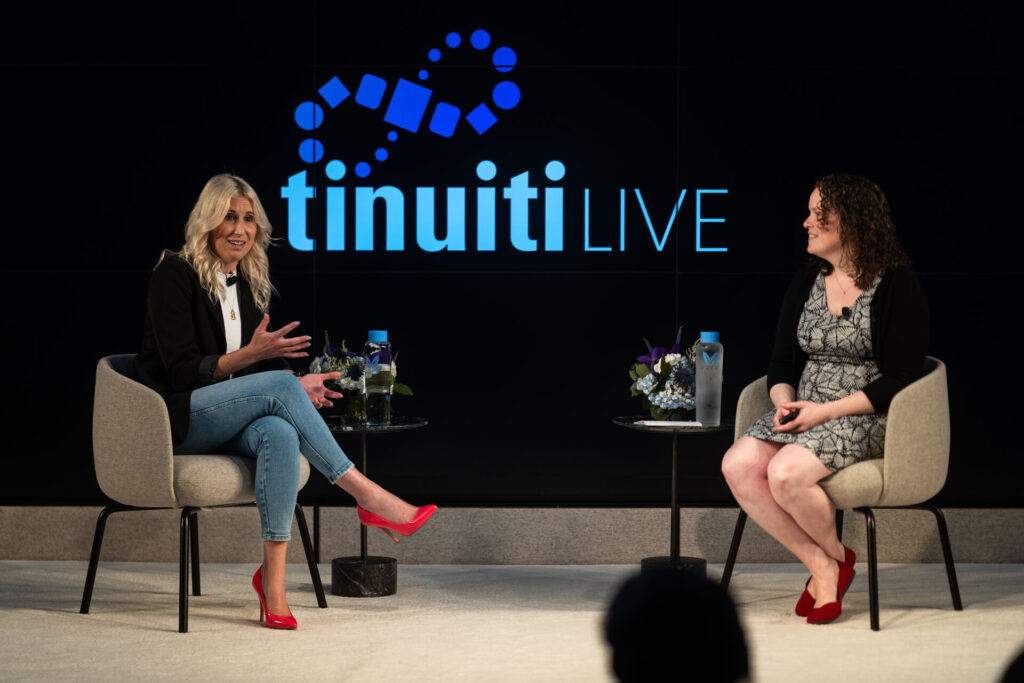
In our new privacy-first world, Lifecycle Marketing has broken out ahead of the pack and in this fireside chat Audra Beutler, CRM and Loyalty Manager from Brooks and Jacquelyn Burnside, Senior Manager, Lifecycle Marketing from Tinuiti explored how Brooks has lapped the competition with its integrated messaging approach by leveraging customer data for a more comprehensive (and human) communications journey.
To start the session, Beutler took a look back at how Brooks’ marketing model changed during the height of the pandemic. She mentioned how Brooks had to evolve from being more retail-centric to digital-centric. During this time period, Brooks welcomed a vast amount of new runners to their brand considering many gyms were closed and people were looking to exercise outdoors. Within this timeframe, the brand accelerated growth within Lifecycle Marketing channels and their 360-Lifecycle marketing approach really came to life. Beutler highlighted that now that retail stores are back open, the brand is fully embracing a hybrid, omni-channel model.
Beutler also covered how Brooks grew their buyer personas and how storytelling became a crucial part of their strategy…
“We have opportunities for so much storytelling and until 2021, we were really reliant on the product and the science and we weren’t talking about the athletes and what we were doing in the running community.”
— Audra Beutler, CRM and Loyalty Manager, Brooks
Beutler shared a few top ways Brooks stepped up their Lifecycle Marketing experience in recent years.
1. Creation of an engagement loyalty program and welcome series – Brooks went from a more traditional loyalty program to providing runners with exclusive content and advice from their team full of coaches, trainers, and nutrition experts. Beutler explained how Brooks Run Club dug into engagement and focused content tapping into the human side of their brand. During this time, they also incorporated a welcome email series so new runners could easily find content on how to get started in the sport.
2. Embracing SMS – Beutler also covered how Brooks has embraced the world of SMS marketing and how the brand recognized they needed multiple touchpoints with their audience. Tinuiti took on Brooks’ SMS strategy in 2021 and the brand has seen 36.46% YoY revenue growth.
“SMS has been a magic bullet for us. It was an opportunity to connect with runners in a more deliberate and thoughtful way.”
— Audra Beutler, CRM and Loyalty Manager, Brooks
3. Implementing automated email – Beutler explained how building out automation emails was a crucial way for Brooks to engage their customers with personalized and timely emails, based on a recent action. This strategy helped Brooks re-engage with customers beyond the purchase. They implemented emails like post-purchase, win back, and a re-engagement series (abandoning cart, abandoning browse, post-purchase automation after buying shoes, apparel or run bras). This tactic contributed to a significant YoY revenue lift.
To close the session Beutler and Burnside highlighted a few key takeaways:
Make sure to check out this session!
Saying ‘I Do’ to Streaming: How Wedding Company Zola’s Leap into Streaming Paid Off
Catherine Kaelin, Director of Growth Marketing, Zola
Kaitlyn Caimano, CIO, Bliss Point Media, Tinuiti
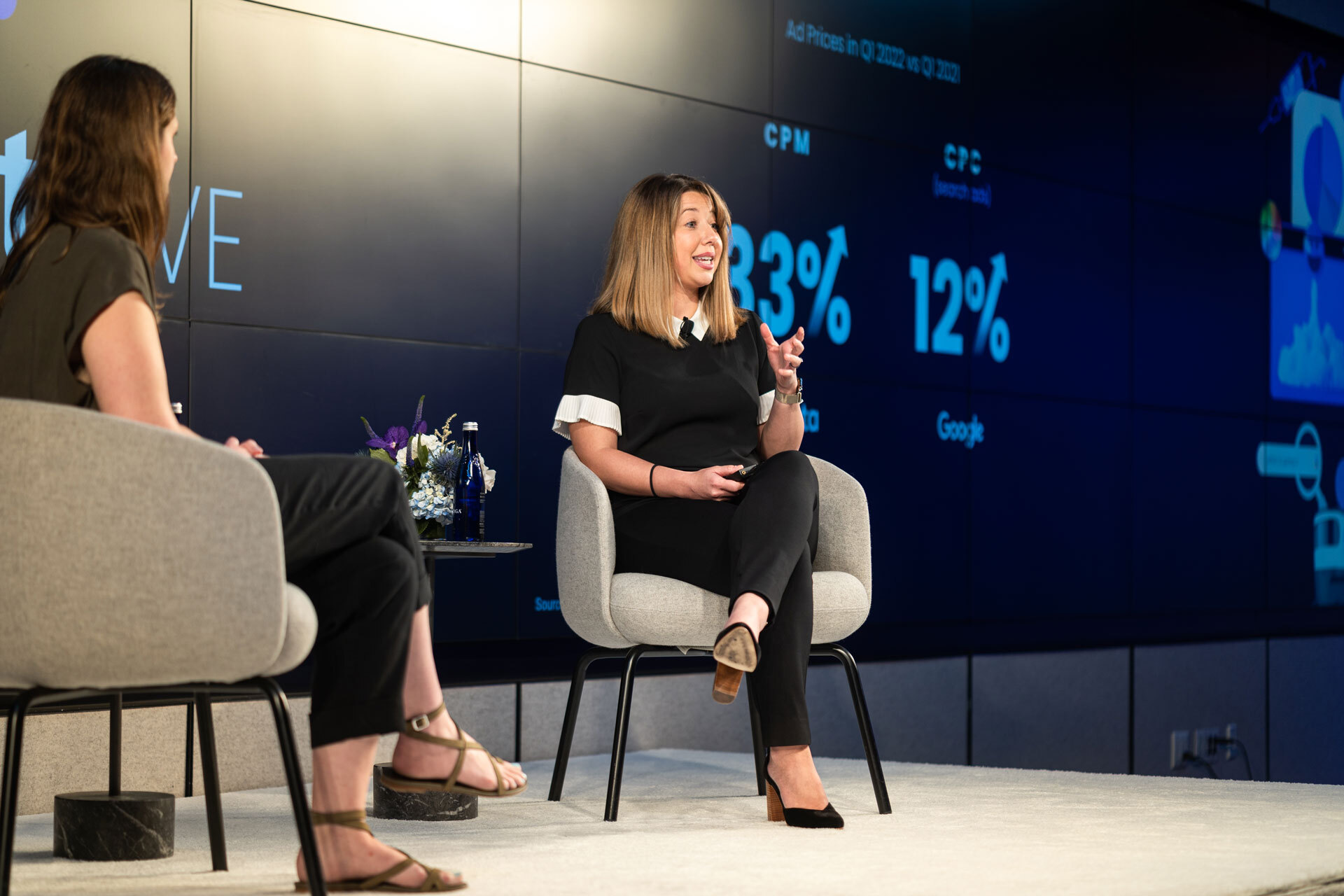 Kaitlyn Caimano and Catherine Kaelin centered their discussion around one of the hottest avenues in advertising today—Streaming. Caimano led attendees through key considerations of streaming advertising, with she and Kaelin sharing how Zola—the wedding company with the fastest-growing wedding registry—has blazed new trails for the brand through streaming video and digital audio campaigns with Bliss Point Media (BPM).
Kaitlyn Caimano and Catherine Kaelin centered their discussion around one of the hottest avenues in advertising today—Streaming. Caimano led attendees through key considerations of streaming advertising, with she and Kaelin sharing how Zola—the wedding company with the fastest-growing wedding registry—has blazed new trails for the brand through streaming video and digital audio campaigns with Bliss Point Media (BPM).
Their conversation centered on 3 primary topics:
Ad prices have increased on Meta (33% CPM increase) and Google (12% CPC increase), comparing Q1 2022 to Q1 2021
Google and Meta are excellent performance drivers, but it can be risky to reserve the majority of your performance marketing budget to these alone due to their monopolistic auction environments that continue to command higher spend
These higher advertising costs have been largely driven by pricing increases and privacy-related changes
“We saw iOS roll out the App Tracking Transparency function last year, and that has had a major impact on the ad effectiveness of platforms like Meta. Now, couple that with visibility. There is very little visibility in these markets; they are called walled gardens for a reason. You can pull back very little raw data, which makes it difficult to measure, pull into your marketing mix model, and dedupe across your portfolio.”
— Kaitlyn Caimano, CIO, Bliss Point Media, Tinuiti
If brands haven’t yet explored streaming, the time is now. After a year in a high-demand seller’s market, we have moved into a buyer’s market with more available ad inventory. This ad availability has been driven by some of last year’s major advertisers reducing their spend in 2022 due to inflation, supply chain issues, and other concerns.
Streaming is “an incentive-based market.” To not take advantage of it now while it’s a buyer’s market would be “like having a 40% off coupon” and deciding to “wait and pay full price”
“Networks do not want these impressions to go unsold. We have been able to negotiate some of the most efficient CPMs that I have seen in years, and it has allowed our brands to more aggressively invest and take advantage of that.”
— Kaitlyn Caimano, CIO, Bliss Point Media, Tinuiti
Next, Caimano walked attendees through how Bliss Point Media is equipped to provide clients with valuable, accurate measurement using their graph-based technology—no clickstream required.
“When we’re doing this, we really lean into transparency—that is the differentiator here. We are passing back our data to the client; we are strongly encouraging that they leverage incrementality testing, and then passing that data back to them. We are very focused on privacy, so everything is encrypted and hashed in accordance with the regulations of the market, and aligned with our network partnerships.”
— Kaitlyn Caimano, CIO, Bliss Point Media, Tinuiti
Bliss Point Media provides clients with insights they can validate externally, giving them the necessary confidence to secure more budget to scale their streaming campaigns. BPM provides clients with a web-based app they can access at any time to understand how their campaigns are performing at the campaign level, network level, device level, and more.
Caimano also discussed that granular targeting options in streaming are more advanced than many realize, with the ability to reach audiences based on age, gender, income, location, and more, while maximizing efficiency.
Before passing the mic to Kaelin, Caimano explained that the power of streaming is amplified when used in conjunction with other tools.
“It’s sight, it’s sound, it’s motion; it’s a fantastic complement to some of these less rich forms of media. And our clients time and time again are seeing these synergistic effects in the data, and you have access to this in the app. The median client on our roster has seen a 13% boost to their results when we observe multitouch effects. The 75th percentile sees a 23% boost, and we’ve seen TikTok in particular—when seeded by awareness on streaming or TV—really feels that impact of the synergistic effects.”
— Kaitlyn Caimano, CIO, Bliss Point Media, Tinuiti
Kaelin kicked off by explaining how people use Zola, and the incredible results they’ve seen since launching in 2013, helping more than 2M couples plan their weddings, “starting with their engagement through newlywed life.”
Zola’s streaming partnership with BPM began in 2017 when they decided to expand beyond the walled gardens of social and search.
“From the very beginning, we shared a lot of our concerns about venturing into streaming with BPM, and the way that they had approached issues with us and kind of thought through some of these challenges from the very early days made it feel like they were a very natural extension of our own internal marketing team. And their technology made understanding attribution—even within our larger marketing mix—feasible, and made us comfortable ultimately taking the leap into streaming.”
— Catherine Kaelin, Director of Growth Marketing, Zola
Kaelin walked attendees through Zola’s primary streaming goals:
Next, Kaelin discussed some of the myths about streaming that were quickly debunked as they ventured into the space.
Expectations: Creative costs would be significantly more expensive than search and social
Reality: “We were able to start from a lot of our social assets and repurpose those—build upon that creative based on some of the quick learnings that we were getting in the BPM app of what was succeeding and what wasn’t, and we were able to consistently iterate and improve our creative over time with fairly low production costs.”
Media Costs
Expectations: Zola anticipated CPMs would be in the $30-$40 range
Reality: “Media costs themselves were actually much more reasonable than we expected. The BPM team has worked hard in terms of negotiating great competitive rates, which initially enabled us to see success on a sort of evergreen streaming approach, but has also in more recent years enabled us to unlock some really splashy premium opportunities that we, in 2017, never probably would have really considered.”
Commitment Requirements
Expectations: Zola anticipated they would need to make sizable upfront commitments and have to spend hundreds of thousands of dollars before they saw results
Reality: “The commitments are very short-term compared to what you might expect, especially on the linear side with upfront commitments. We tend to not have contracts longer than a couple of weeks, so we are able to pivot and continue to be reactive as a business to our performance needs.”
Measurement
Expectations: Measurement would be more of a challenge due to the variety of devices used in streaming, and the inability to track last-click data
Reality: “Measurability has really been the key to our success in this channel. We’ve partnered very closely with BPM and leveraged their proprietary methodology to have user-level attribution in the streaming space.”
Kaelin then took a deeper dive into measurement, exploring the areas that are a top focus for Zola, including: incrementality testing, data transparency, and custom analyses.
Zola’s streaming results:
This is a must-watch streaming session packed with great information, insights, examples, and data. Be sure to stream the on-demand session!
Phil Stolt, SVP, Retail Operations, Tinuiti
Nancy-lee McLaughlin, Sr. Director, Search & Enterprise Services – Amazon & Marketplace, Tinuiti 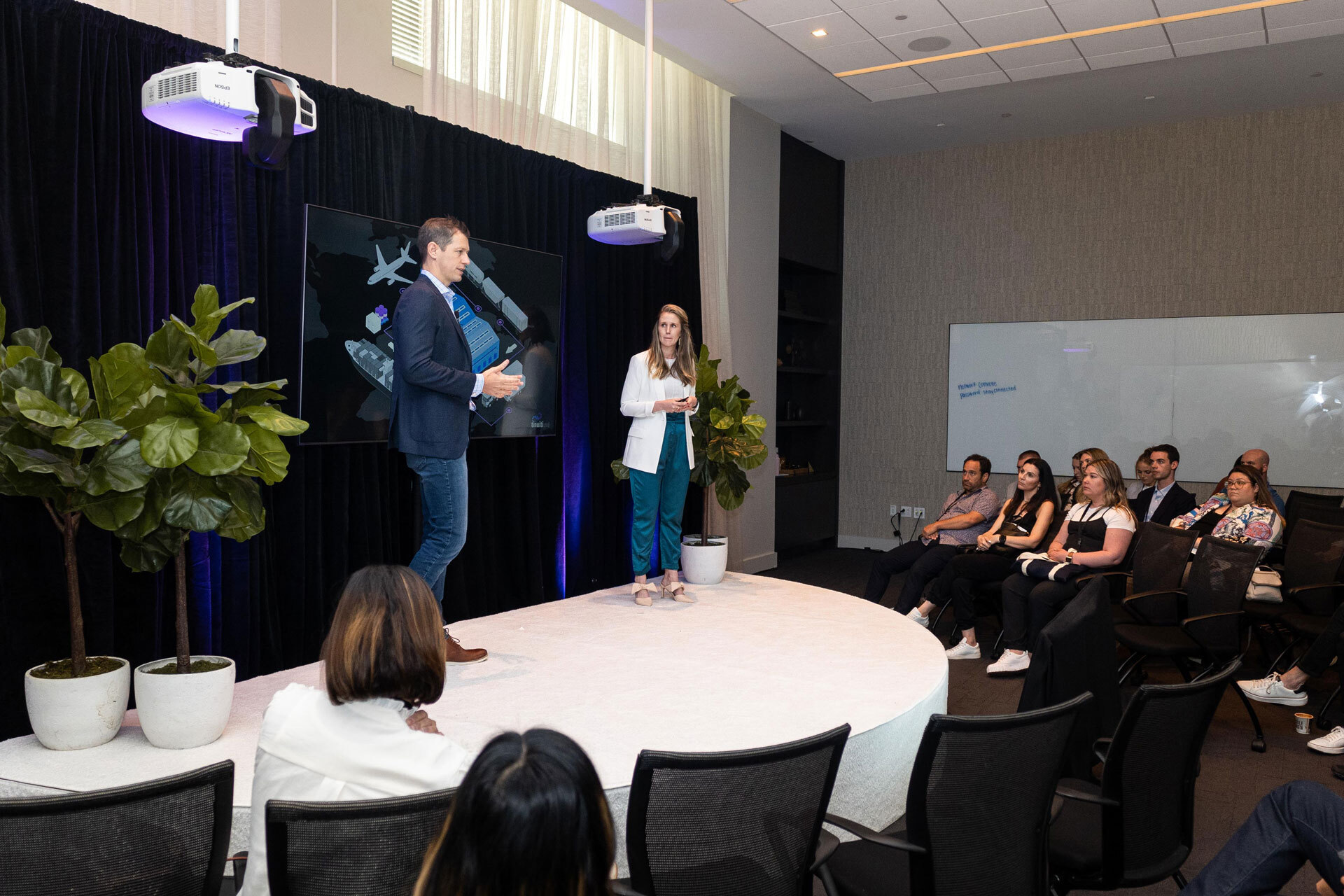
As the pandemic served as an accelerant for online commerce, the Amazon ecosystem evolved quickly to make the offering even more robust – and for some marketers – even more complex. Amazon has innovated not just to help companies sell – but build their brand through Video, Streaming TV, DSP, Stores, Posts, Measurement and Amazon Marketing Cloud. To grow a successful brand on Amazon in 2022, it’s not enough to just run ads. You need to understand the entire customer commerce journey.
In this session, we heard from Tinuiti Amazon heavyweights Phil Stolt, SVP, Retail Operations and Nancy-lee McLaughlin, Sr. Director, Search & Enterprise Services. They covered tips on employing integrated tools as well as strategic operations to accelerate the connected experience across Amazon and all Retail Media.
Don’t miss this session on-demand!
Andrew Richardson, SVP, Analytics & Marketing Science, Tinuiti
Liz Emery, VP, Mobile + Ad Tech Solutions, Tinuiti
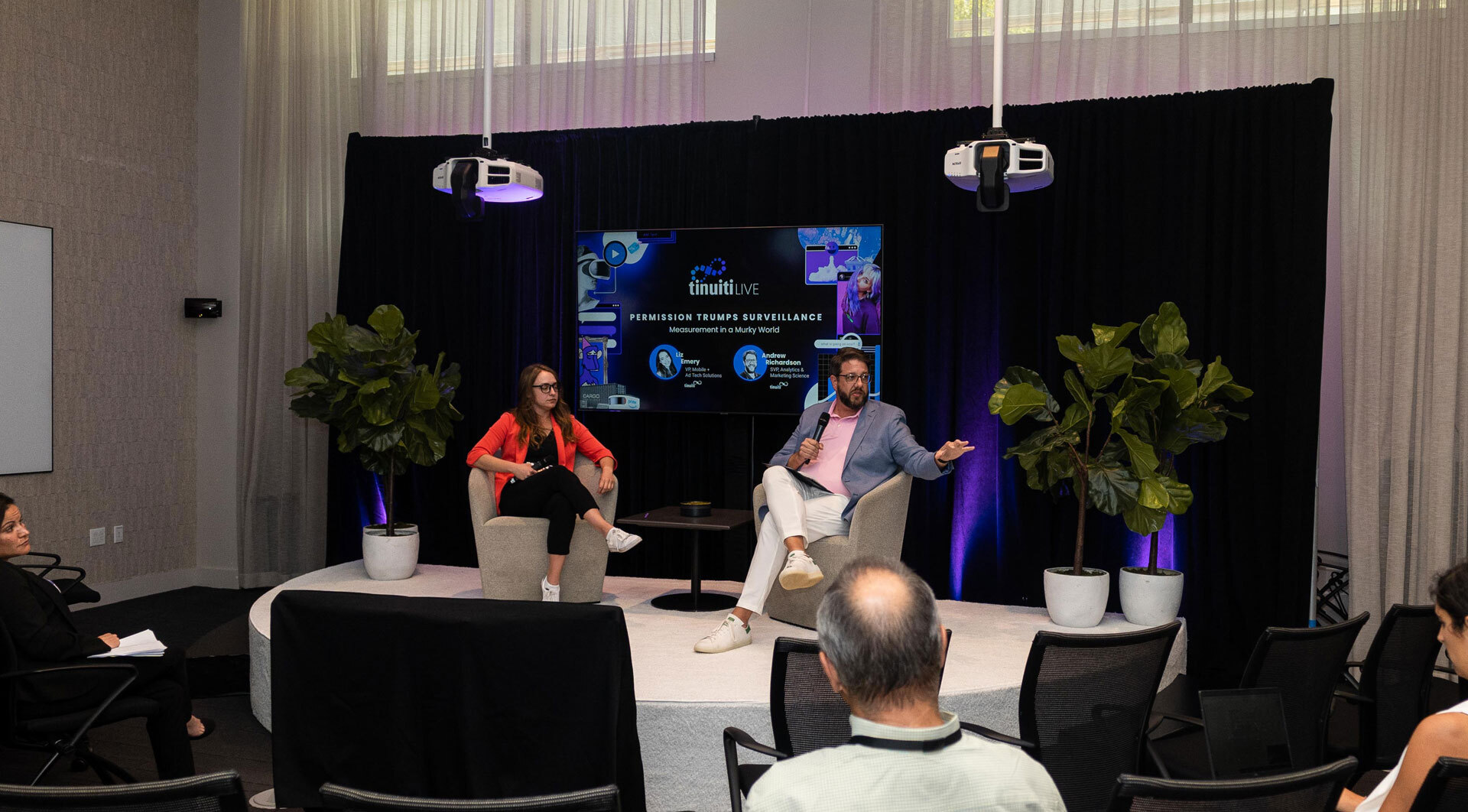
Getting measurement right was already difficult before IDFA and other privacy changes, but in 2022, it can seem nearly impossible for many marketers to determine where to put their money, and which channels are returning the most value at the top and bottom of the funnel. What tools and KPIs brands can count on in our privacy-by-default world? All this and the Metaverse isn’t even here yet!
The people (and the regulators) have spoken. The Future of the Web is a place where privacy trumps all. And the good news is there are better ways of getting data than surveillance. Tinuiti’s top futurists and technologists dove into how brands can gear up for the demise of “Surveillance Marketing” and the rise of “Permission Marketing.” As the Web morphs into a privacy-first place, brands are going to have to pay for attention. And it doesn’t matter what the value exchange is—whether it’s crypto, coupons, or NFTs (and more), what we do know is that data will be scarcer and more valuable than ever.
Check out this can’t-miss session!
Shaun Brown, EVP Commerce, Tinuiti
Allison Ellsworth, Co-Founder / Chief Brand Officer, Poppi 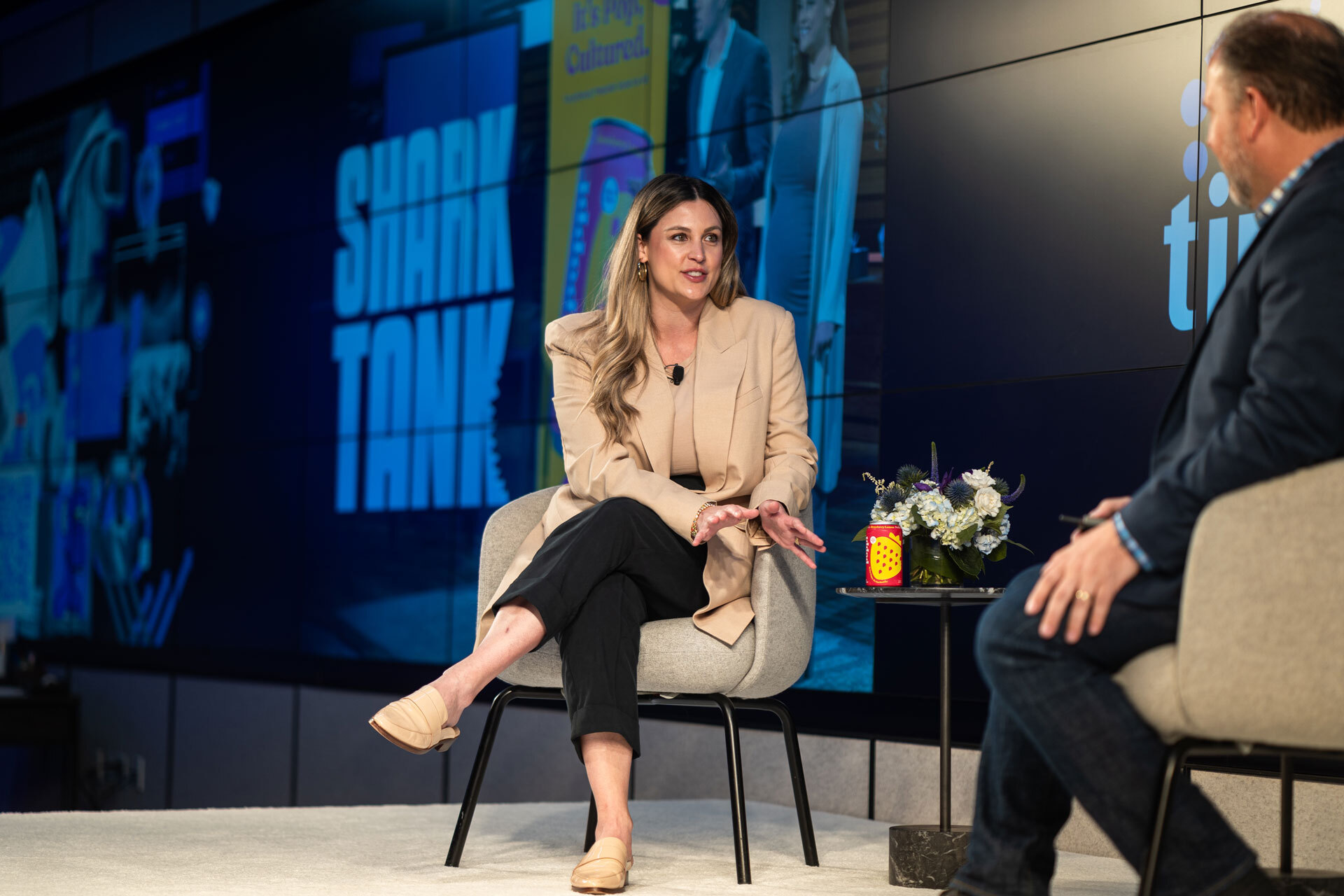 Our client Poppi is revolutionizing the soda category. They are on a mission to disrupt Big Soda and the female-founded brand has achieved exponential growth across retail and Amazon within two years of launching. In this session, Shaun Brown, EVP Commerce at Tinuiti and Allison Ellsworth, Co-Founder / Chief Brand Officer at Poppi sat down to discuss how the company has married brand marketing, streaming advertising, and Amazon to redefine marketing success.
Our client Poppi is revolutionizing the soda category. They are on a mission to disrupt Big Soda and the female-founded brand has achieved exponential growth across retail and Amazon within two years of launching. In this session, Shaun Brown, EVP Commerce at Tinuiti and Allison Ellsworth, Co-Founder / Chief Brand Officer at Poppi sat down to discuss how the company has married brand marketing, streaming advertising, and Amazon to redefine marketing success.
Ellsworth started this fireside chat by explaining Poppi’s history and journey to date. The brand started by selling their sodas at farmer’s markets and have since been on Shark Tank and are now selling in retail stores across the country. Ellsworth described how there has always been three major tactics when creating the brand experience for Poppi:
Next, Ellsworth explored the various digital channels Poppi has welcomed into its marketing strategy over the past two years in business…
“We’ve been on TikTok just over a year and we have over 1 billion views and it’s because we’ve really been utilizing it authentically.”
— Allison Ellsworth, Co-Founder / Chief Brand Officer, Poppi
To wrap the session, Ellsworth highlighted her key takeaways she wanted people to leave with:
“When it comes to data, it’s nice to have but sometimes you have to go with your gut and if you can put the brand first and marry it with performance marketing, that is going to be the key.”
— Allison Ellsworth, Co-Founder / Chief Brand Officer, Poppi
Steve Hoffman, Partner, McKinsey & Company 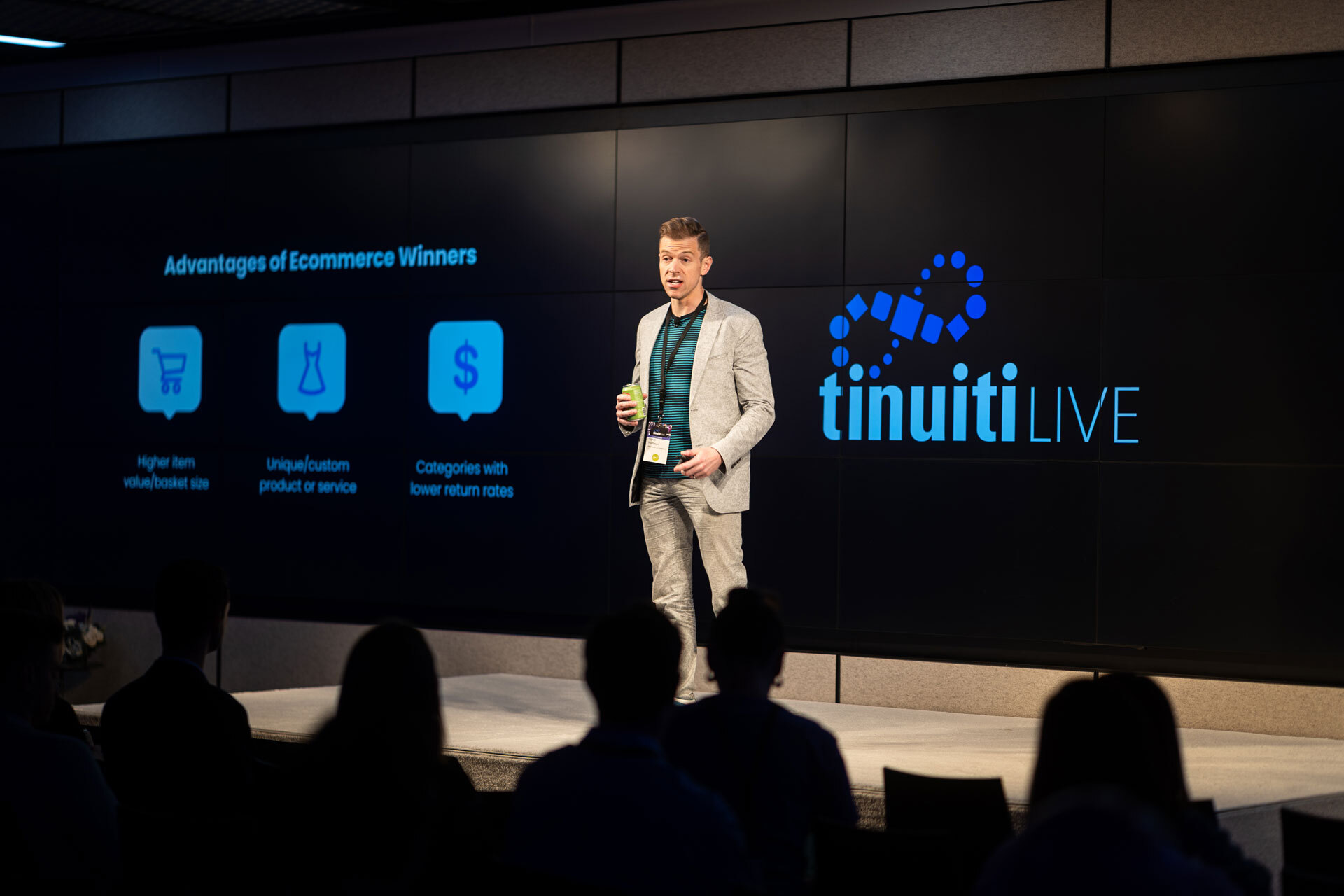
Steve Hoffman—who leads the Retail Procurement & Sustainability practice as a Partner at McKinsey & Company’s Chicago office, and has served more than 50 retail and consumer clients across more than 15 countries on operational issues throughout his career—was the perfect fit to lead the ‘Change’ keynote.
With the breakneck, pandemic-fueled growth of the last few years in the rearview, 2022 is shaping up to be the Year of the Ecommerce Catch-22—big online growth doesn’t always result in big margins in today’s climate. Skyrocketing online sales have gone hand-in-hand with costs rising equally fast. And as retailers face a potential impending global financial turndown, it’s crucial to recognize that digital growth alone is not a true measure of success, rather profitable digital growth.
Hoffman shared his groundbreaking research on Solving the paradox of growth and profitability in e-commerce.
Some top findings and takeaways from his research include:
“Many estimates would say that by 2024, ecommerce will probably be about 50% of total retail sales. I think right now I would say it’s a bit of a yellow light turning into a red light in terms of: How do you actually manage the long-term value of this?”
— Steve Hoffman, Partner, McKinsey & Company
Hoffman then shared how McKinsey tackled answering that very question, and their findings, including:
Next, Hoffman discussed some of the common advantages ‘ecommerce winners’ have:
Next, Hoffman explored four imperatives organizations should follow on the path to profitability:
Reduce operating costs while providing an excellent consumer experience.
“There are a lot of things that retailers and brands can do that actually are lower cost, and perhaps even better experience. One example would be the idea of BOPUS: Buy Online, Pick Up In Store. I think it’s a really underutilized asset that most retailers have. Right now it’s pretty clunky; but really, it gets you into the store, it reduces the cost of fulfillment…it can actually improve the overall customer experience because you can get an item faster when you want it.”
— Steve Hoffman, Partner, McKinsey & Company
Another example Hoffman offered is incentivizing shoppers to use a debit card as it carries a lower transaction cost for the seller.
Next, Hoffman walked attendees through the importance of really diving into, understanding, and optimizing your fulfillment process to improve profitability, analyzing buying and returns costs and trends down to the item, category, and promotion level.
“I haven’t personally worked with a client who actually has someone who actually owns returns, end-to-end. There’s folks in supply chain that own the return center; there’s folks who own the returns experience…there’s folks who own return partners; there’s people that own the reverse logistics process—maybe the idea of sending items back to one of your vendor partners. But there’s no one who actually owns returns.”
— Steve Hoffman, Partner, McKinsey & Company
— Steve Hoffman, Partner, McKinsey & Company
Hoffman encouraged brands to do the necessary work to understand the profitability and lifetime value of every item they sell, finding ways to include profitability into the decision-making process regarding item placement/visibility, promotions, and more.
Crystal Duncan, Head of Partnership Marketing, Tinuiti
Adrienne Lahens, Global Head of Operations For TikTok Creator Marketing Solutions, TikTok 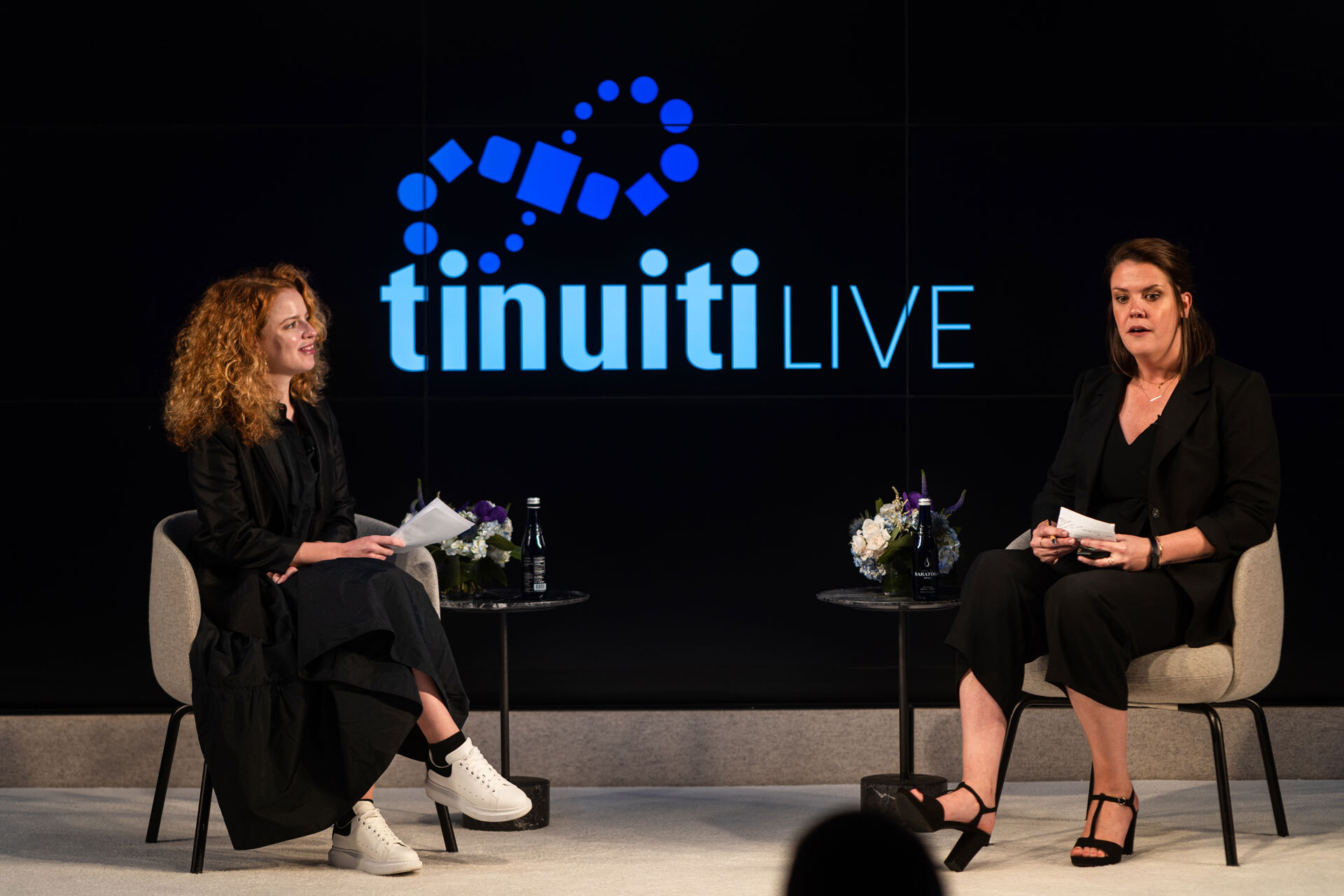 Crystal Duncan, Head of Partnership Marketing, Tinuiti, jumped right into the conversation challenging how many brands think Influencer Marketing is only an upper funnel tactic. She explained that nowadays Influencers are actually creating significant conversions.
Crystal Duncan, Head of Partnership Marketing, Tinuiti, jumped right into the conversation challenging how many brands think Influencer Marketing is only an upper funnel tactic. She explained that nowadays Influencers are actually creating significant conversions.
Adrienne Lahens, Global Head of Operations For TikTok Creator Marketing Solutions at TikTok, highlighted how people are coming to TikTok to be entertained and how the app has made it incredibly easy for people to create on TikTok. She also highlighted how valuable working with creators is for brands and how brands who partnered with these creators saw a 26% lift in brand favorability and a 22% lift in brand recommendations.
“TikTok is shaping the marketing funnel. In terms of collapsing the marketing funnel, consumers are seeing creators talk about these products and then they are pressing the purchase button right away.”
— Adrienne Lahens, Global Head of Operations For TikTok Creator Marketing Solutions, TikTok
Both Duncan and Lahens highlighted how important it is to find the right fit with creators as there are so many to choose from today. Duncan then covered a few baseline questions that need to be asked with building the foundation of your influencer marketing strategy:
“If we don’t have the strategy in place and understand what numbers are we are trying to achieve, we are building our house without a foundation.”
— Crystal Duncan, Head of Partnership Marketing, Tinuiti
Lahens then shared a few of her creative recommendations and tricks to create the best output on TikTok:
“We’re talking to brands about how they should show up on this platform, and really unlearn the antiquated marketing approaches and trying to teach brands how to lean into the parts of TikTok that really make the platform unique.”
— Adrienne Lahens, Global Head of Operations For TikTok Creator Marketing Solutions, TikTok
Duncan then explained the journey influencer marketing has been through over the years. She described how it used to be a fun new method for brands to test and how it’s table stakes for many marketers today. Duncan also covered how brands are utilizing influencer content in many different ways from a paid perspective (social, OTT, etc.) and an owned perspective.
If you’re interested in influencer marketing, this is a must-watch session. Be sure to check out on-demand!
Diana DiGuido, Chief Client Officer, Tinuiti
Cristie Fay, Group Director, Client Strategy, Tinuiti 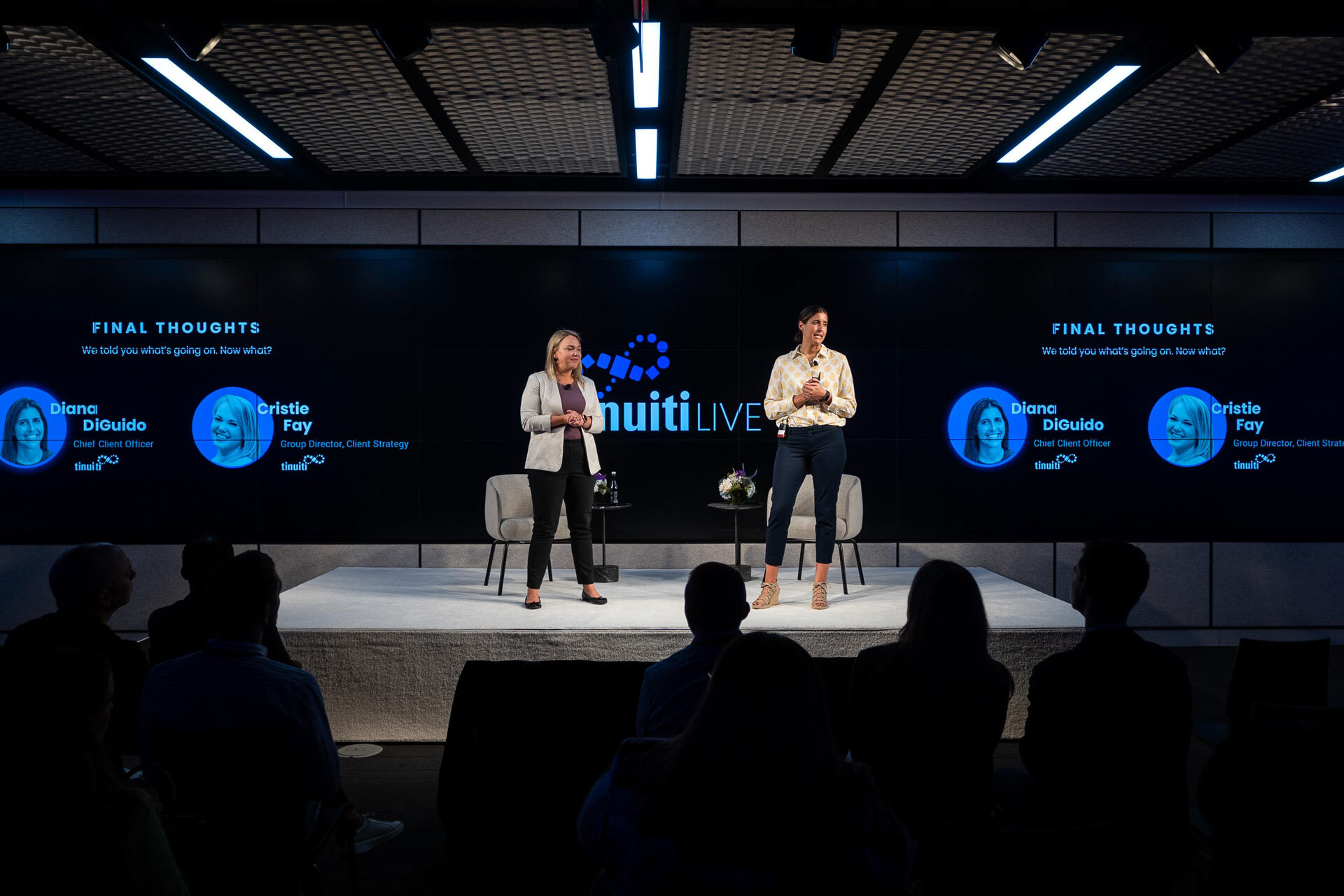
To close out an epic Tinuiti Live 2022 Diana DiGuido, Chief Client Officer and Cristie Fay, Group Director of Client Strategy at Tinuiti gave attendees key takeaways from the jam-packed day.
Check them out below:
This year’s Tinuiti Live was bigger and better than ever. If you couldn’t attend the in-person event or the livestream and want to learn more, check out the on-demand sessions. If you’d like to chat with any of our team members about topics covered at Tinuiti Live, contact us today for more information.
